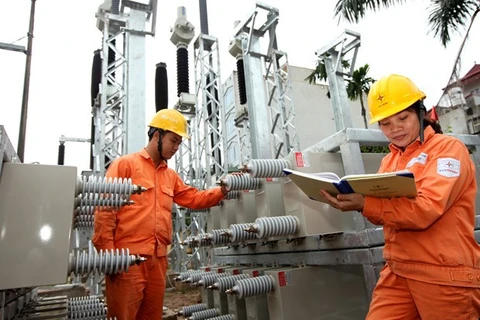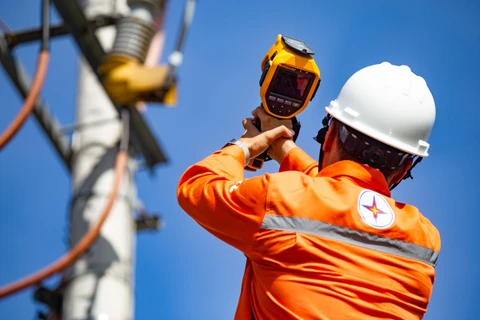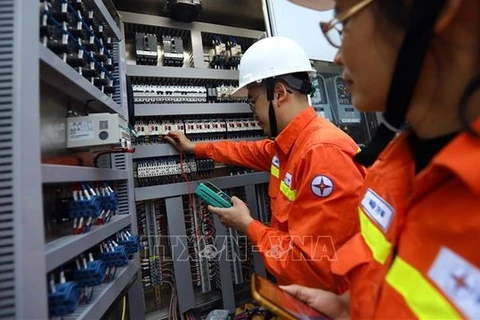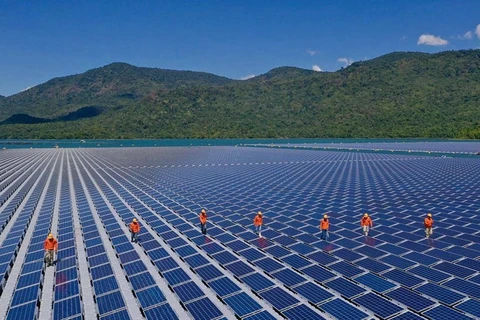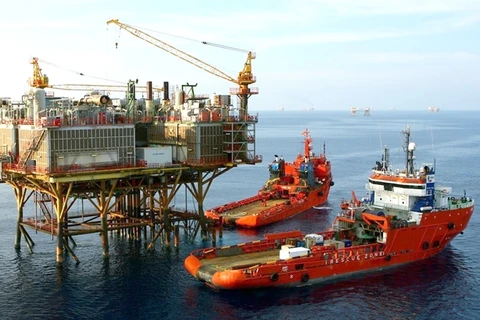Hanoi (VNS/VNA) - Nguyen Thi Hoa, who lives in Tay Ho district in Hanoi, has actively reduced her electricity usage over the past two months.
To save electricity, instead of turning on all the lights every evening as before, her house now only uses half the lights.
In addition, she always reminds her family members to turn off unnecessary light bulbs and electrical equipment.
"I read newspapers about the electricity shortage, so I always remind my family to reduce electricity use as much as possible. Moreover, if we don't conserve electricity, our monthly costs will increase significantly," said Hoa.
During April and May, there were several prolonged hot weather periods across the country. The temperature sometimes reached 39-40 degrees Celsius.
This year, it is forecast that the temperature will be approximately 0.5 degrees Celsius higher than the multi-year average. Consequently, the demand for electricity will increase in the near future.
The power supply in the dry season this year is predicted to be challenging due to the significant rise in electricity demand.
Recognising the difficult situation, many businesses have also actively implemented various solutions to conserve electricity in their production processes.
The Hung Yen Garment Corporation has 13 plants with 16,000 workers and 300 sewing lines, so its demand for electricity is huge.
The company gives instructions about power saving to every worker and builds a process to save electricity.
It replaces electrical equipment with new technology that consumes less electricity, turns off electricity in unoccupied rooms and limits lighting equipment in corridors.
Nguyen Xuan Duong, chairman of the corporation’s board of directors, said that all enterprises under the corporation had relatively large roofs, thus the corporation aimed for each enterprise to install solar power.
With the methods that had been implemented, the corporation reduced about 20% of electricity, said Dương.
To save electricity, instead of turning on all the lights every evening as before, her house now only uses half the lights.
In addition, she always reminds her family members to turn off unnecessary light bulbs and electrical equipment.
"I read newspapers about the electricity shortage, so I always remind my family to reduce electricity use as much as possible. Moreover, if we don't conserve electricity, our monthly costs will increase significantly," said Hoa.
During April and May, there were several prolonged hot weather periods across the country. The temperature sometimes reached 39-40 degrees Celsius.
This year, it is forecast that the temperature will be approximately 0.5 degrees Celsius higher than the multi-year average. Consequently, the demand for electricity will increase in the near future.
The power supply in the dry season this year is predicted to be challenging due to the significant rise in electricity demand.
Recognising the difficult situation, many businesses have also actively implemented various solutions to conserve electricity in their production processes.
The Hung Yen Garment Corporation has 13 plants with 16,000 workers and 300 sewing lines, so its demand for electricity is huge.
The company gives instructions about power saving to every worker and builds a process to save electricity.
It replaces electrical equipment with new technology that consumes less electricity, turns off electricity in unoccupied rooms and limits lighting equipment in corridors.
Nguyen Xuan Duong, chairman of the corporation’s board of directors, said that all enterprises under the corporation had relatively large roofs, thus the corporation aimed for each enterprise to install solar power.
With the methods that had been implemented, the corporation reduced about 20% of electricity, said Dương.
Tran Viet Ngai, chairman of the Vietnam Energy Association, said that in the context of prolonged hot weather, it is essential to implement electricity saving. The work needs to be done immediately and consistently.
“Saving electricity is a national policy that is extremely important and necessary. Not only the electricity industry but every family must raise awareness of saving electricity,” he said.
Ngai proposed the Party, the State and Government create conditions for the electricity industry, the oil, gas, coal-minerals and other energy industries to build more factories to fix the electricity shortage.
The capital city of hanoi has instructed citizens about saving electricity. Administrative agencies, offices and schools are required to turn off or reduce 50% of the lighting system in corridors, parking lots, campuses, and public areas.
They are recommended to use 50% of the elevators depending on the use frequency, and encourage use of stairs.
They are also encouraged to take advantage of natural light in the office.
Trading and services enterprises are asked to turn off all decorative lighting, advertising and signs from 10pm. They are encouraged to use backup generators and solar power if possible.
Every evening, electricity workers in Hoang Mai district go around the streets and alleys, and use loudspeakers to instruct people to use electricity sparingly.
The work often starts at 7.30pm and ends at 10pm.
Thai Van Bien, an electricity worker, said that most of the residents followed the instructions.
Since May 17, the Hanoi Urban Lighting Company (Hapulico) has operated a power-saving mode for the public lighting system, ensuring both lighting and public security and order.
The work is in response to Prime Minister Pham Minh Chinh’s Official Dispatch No 397/CĐ-TTg on May 13 on implementing urgent measures to cope with drought, water shortage, and conduct the national programme on economical and efficient use of energy.
Hapulico general director Nguyen Anh Tuan said that the company turned on the lights 30 minutes later and turned them off 30 minutes earlier than the normal operating mode.
For street lights, lights in alleys and suburban areas, the company will cut down one-third of the number of lights.
“Saving electricity is a national policy that is extremely important and necessary. Not only the electricity industry but every family must raise awareness of saving electricity,” he said.
Ngai proposed the Party, the State and Government create conditions for the electricity industry, the oil, gas, coal-minerals and other energy industries to build more factories to fix the electricity shortage.
The capital city of hanoi has instructed citizens about saving electricity. Administrative agencies, offices and schools are required to turn off or reduce 50% of the lighting system in corridors, parking lots, campuses, and public areas.
They are recommended to use 50% of the elevators depending on the use frequency, and encourage use of stairs.
They are also encouraged to take advantage of natural light in the office.
Trading and services enterprises are asked to turn off all decorative lighting, advertising and signs from 10pm. They are encouraged to use backup generators and solar power if possible.
Every evening, electricity workers in Hoang Mai district go around the streets and alleys, and use loudspeakers to instruct people to use electricity sparingly.
The work often starts at 7.30pm and ends at 10pm.
Thai Van Bien, an electricity worker, said that most of the residents followed the instructions.
Since May 17, the Hanoi Urban Lighting Company (Hapulico) has operated a power-saving mode for the public lighting system, ensuring both lighting and public security and order.
The work is in response to Prime Minister Pham Minh Chinh’s Official Dispatch No 397/CĐ-TTg on May 13 on implementing urgent measures to cope with drought, water shortage, and conduct the national programme on economical and efficient use of energy.
Hapulico general director Nguyen Anh Tuan said that the company turned on the lights 30 minutes later and turned them off 30 minutes earlier than the normal operating mode.
For street lights, lights in alleys and suburban areas, the company will cut down one-third of the number of lights.
As for streets with four lanes of lights such as Vo Chi Cong, Hoang Sa and Thang Long, it cuts 50% of the lights.
For lighting systems in parks and flower gardens, it operates up to 50% of the lights and cuts off all lights after 11pm.
Tuan said that in recent years, Hapulico had advised Hanoi authorities to use light-emitting diode (LED) in public lighting systems to replace traditional bulbs, thereby reducing 50% of power consumption.
From the last days of May, although the Noi Bai International Airport was crowded with passengers, nearly 80% of the lights in the terminal were turned off.
All billboards' lights that are not used and decorative lighting are completely turned off.
According to the Hanoi Electricity Corporation (EVNHANOI), by saving electricity in public lighting, the city saved a significant amount of power, about 12 million kWh from May 15 to 30 this year.
EVNHANOI will continue to deploy different solutions and plans to save 18 million kWh this month./.
For lighting systems in parks and flower gardens, it operates up to 50% of the lights and cuts off all lights after 11pm.
Tuan said that in recent years, Hapulico had advised Hanoi authorities to use light-emitting diode (LED) in public lighting systems to replace traditional bulbs, thereby reducing 50% of power consumption.
From the last days of May, although the Noi Bai International Airport was crowded with passengers, nearly 80% of the lights in the terminal were turned off.
All billboards' lights that are not used and decorative lighting are completely turned off.
According to the Hanoi Electricity Corporation (EVNHANOI), by saving electricity in public lighting, the city saved a significant amount of power, about 12 million kWh from May 15 to 30 this year.
EVNHANOI will continue to deploy different solutions and plans to save 18 million kWh this month./.
VNA

